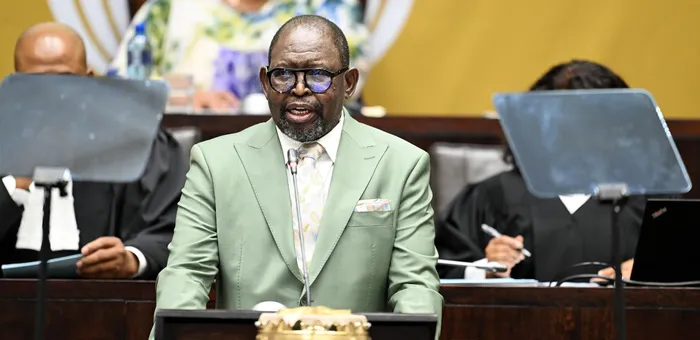
Finance Minister Enoch Godongwana tables his Medium Term Budget Policy Statement.
Image: Photo: Phando Jikelo / RSA Parliament
Finance Minister Enoch Godongwana said on Wednesday that government will phase out and scale down low-priority and underperforming programmes.
Tabling the medium Term Budget Policy Statement (MTBPS), Godongwana said there will be improved operations across departments and provinces while most expenditure would be directed towards social wage.
“Moderate increases in provinces’ and municipalities' share of revenue are intended to alleviate provincial health and education pressures and bolster local basic services, while grant consolidation, performance-based incentives and Targeted and Responsible Savings (TARS) (are intended to) improve spending efficiency.
“Additional local government reforms, which are crucial to establish the sustainable provision of basic services to millions of South Africans, will begin to roll out over the medium term,” he said.
Godongwana’s comment comes months after there were delays in approving the budget after the DA, a partner in the Government of National Unity (GNU), threatened to protest the VAT increase and demanded some concessions, such as expenditure reviews and cutting wastage in government spend.
He noted that the MTBPS followed a highly contested 2025 Budget where government emerged with a broad consensus on reforms to improve value for money in spending and enhance engagement with the budget.
“These reforms, which are already built into the 2026 Budget process, will help government to cut waste and improve the effectiveness of spending.”
Addressing MPs in Parliament in the afternoon, Godongwana said eliminating waste and inefficiency in government was non-negotiable.
“The TARS initiative systematically identifies duplication, eliminates waste and reorganises programmes to deliver for money. We are implementing medium term savings of R6.7 billion by closing down or scaling down low-priority and under-performing programmes immediately.”
He said the exercise involved identifying people double-dipping and defrauding the social grants system.
Godongwana stated that during the expenditure reviews conducted between April 2024 and May 2025, the National Treasury found that the budget process was driven by inputs and compliance.
There has been limited appreciation of the realities of constrained resources.
“Over time where government did not engage with specific trade-offs, this has led to across-the-board cuts to budgets and eroded services and financial management,” he said.
According to Godongwana, the new budget cycle has introduced reforms that change how departments engage with the budget process and builds on expenditure reviews that the National Treasury conducted over the years.
He also said the MTEF guidelines have introduced the TARS initiative.
“This identifies low-priority or under-performing programmes for reductions, mergers or closure to enhance fiscal sustainability and service delivery, with savings rechanneled within sectors or broader government priorities.”
“These reforms, coupled with performance-oriented frameworks and stronger oversight mechanisms, are intended to bolster efficiency, protect frontline services and create space to increase spending on government priorities, including growth enhancing infrastructure.”
Godongwana said a programme assessment matrix has been introduced to enable systematic review of programmes so that departments can identify low-priority or underperforming programmes to be considered by Cabinet for review and rationalisation.
“Changes are being implemented in phases, with savings of R6.7 billion included in the 2026 MTEF. This includes savings realised from eliminating misrepresentation in social grants by using tighter income verification processes, and phasing out the Public Transport Network Grant (PTNG), which has not met its objective and replacing it with better targeted support.”
He said the PTNG has failed to meet its objective and some cities failed entirely to get the projects off the ground.
“An integrated public transport system is essential to support working class communities. We will be reconsidering how to lower the cost of mobility and rework the institutional framework,” said Godongwana, adding that commuter rail was the backbone of the public transport system.
Godongwana added that there were other measures being implemented.
These include the implementing the recommendations of the Department of Public Service and Administration’s personnel expenditure review, reviewing several local government conditional grants, the Sector Education and Training Authorities and assessing incentives managed by the Department of Trade, Industry and Commission, among others.
He added that post-school education sector continue to underperform in throughput rates, despite increased expenditure.
“Government will review the Community Education and Training Sector as well as the skills development landscape to determine how to improve outcomes.”
“An update will be provided in the February Budget review,” Godongwana said.
mayibonwge.maqhina@inl.co.za